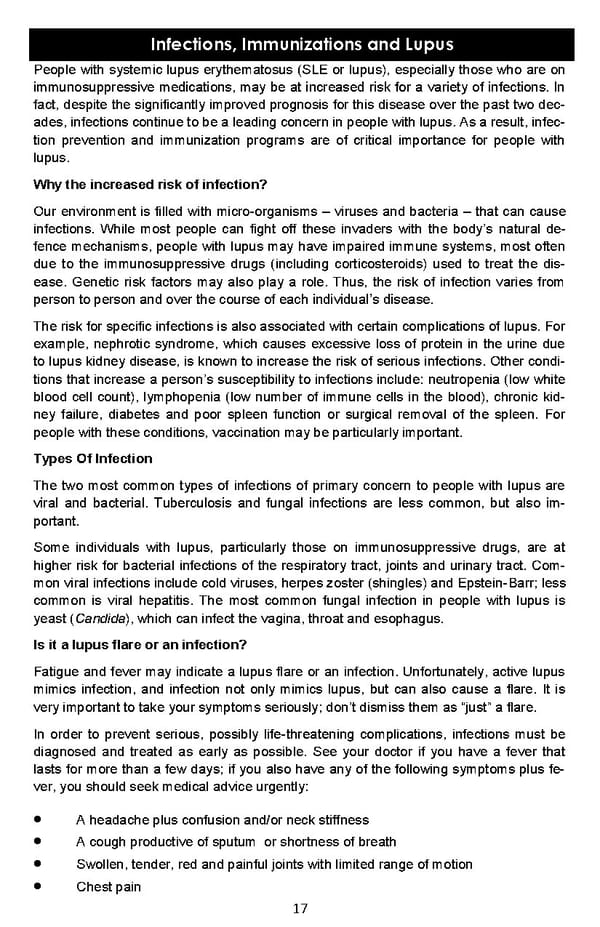Infections, Immunizations and Lupus People with systemic lupus erythematosus (SLE or lupus), especially those who are on immunosuppressive medications, may be at increased risk for a variety of infections. In fact, despite the significantly improved prognosis for this disease over the past two dec- ades, infections continue to be a leading concern in people with lupus. As a result, infec- tion prevention and immunization programs are of critical importance for people with lupus. Why the increased risk of infection? Our environment is filled with micro-organisms – viruses and bacteria – that can cause infections. While most people can fight off these invaders with the body’s natural de- fence mechanisms, people with lupus may have impaired immune systems, most often due to the immunosuppressive drugs (including corticosteroids) used to treat the dis- ease. Genetic risk factors may also play a role. Thus, the risk of infection varies from person to person and over the course of each individual’s disease. The risk for specific infections is also associated with certain complications of lupus. For example, nephrotic syndrome, which causes excessive loss of protein in the urine due to lupus kidney disease, is known to increase the risk of serious infections. Other condi- tions that increase a person’s susceptibility to infections include: neutropenia (low white blood cell count), lymphopenia (low number of immune cells in the blood), chronic kid- ney failure, diabetes and poor spleen function or surgical removal of the spleen. For people with these conditions, vaccination may be particularly important. Types Of Infection The two most common types of infections of primary concern to people with lupus are viral and bacterial. Tuberculosis and fungal infections are less common, but also im- portant. Some individuals with lupus, particularly those on immunosuppressive drugs, are at higher risk for bacterial infections of the respiratory tract, joints and urinary tract. Com- mon viral infections include cold viruses, herpes zoster (shingles) and Epstein-Barr; less common is viral hepatitis. The most common fungal infection in people with lupus is yeast (Candida), which can infect the vagina, throat and esophagus. Is it a lupus flare or an infection? Fatigue and fever may indicate a lupus flare or an infection. Unfortunately, active lupus mimics infection, and infection not only mimics lupus, but can also cause a flare. It is very important to take your symptoms seriously; don’t dismiss them as “just” a flare. In order to prevent serious, possibly life-threatening complications, infections must be diagnosed and treated as early as possible. See your doctor if you have a fever that lasts for more than a few days; if you also have any of the following symptoms plus fe- ver, you should seek medical advice urgently: • A headache plus confusion and/or neck stiffness • A cough productive of sputum or shortness of breath • Swollen, tender, red and painful joints with limited range of motion • Chest pain 17
 Living Well With Lupus Facts Booklet Page 16 Page 18
Living Well With Lupus Facts Booklet Page 16 Page 18